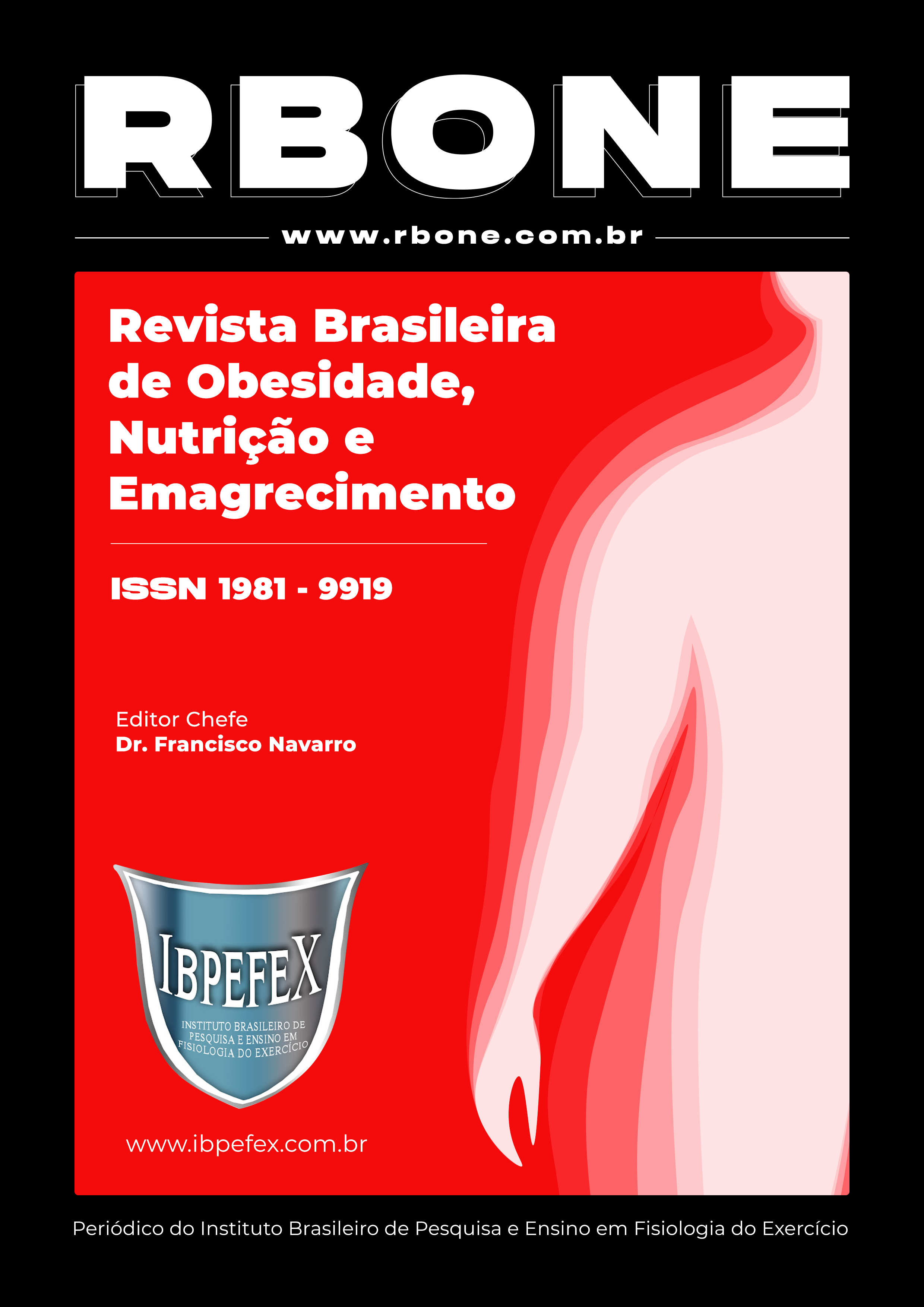Eating behavior of university students during social isolation
Abstract
Objective: To evaluate the food of university students during social isolation, in order to understand their relationship with food during this period. Materials and Methods: Cross-sectional observational study, in which undergraduate students at the Federal University of Pelotas were evaluated by means of an electronic questionnaire, from July to October 2021. The questionnaire was divided into two parts, evaluating the profile of students and eating behavior. As a tool, the questionnaire “The three factor eating questionnaire - R21” (TFEQ-R21) was used, which scores the 3 domains of eating behavior on a scale from 0 to 100. Data were automatically forwarded to an Excel® spreadsheet generated by Google Forms. A descriptive analysis of the variables gender, age group, origin, area of knowledge and graduation semester was presented through means with their respective standard deviations. Results: The study sample consisted of 397 university students, most of them women (78.59%) between 18 and 30 years old (87.66%), coming from the south and southeast regions (96.73%). Among the areas of knowledge and current semester, 47.86% were in the health area and 64.99% were between the first and sixth semester of graduation. There is a smaller relationship only between emotional nutrition and sex, showing that women have higher scores for this domain. Conclusion: Most responses were from women, with a reduction focused on emotional eating. The reflexes of emotional eating on food intake result in compensatory effects, making food choices not conscious.
References
-Aro, F.; Pereira, B.; Bernardo, D. Comportamento alimentar em tempos de pandemia por Covid-19. Brazilian Journal of Development. 2021.
-Boukrim, M.; Obtel, M.; Kasouati, J.; Achbani, A.; Razine, R. "COVID-19 and confinement: Effect on weight load, physical activity and eating behavior of higher education students in southern Morocco", Annals of Global Health. Vol. 87. Núm. 1. p. 1-11. 2021. DOI: 10.5334/aogh.3144.
-Browning, M.; Larson, L.; Sharaievska, I.; Rigolon, A.; McAnirlin, O.; Mullenbach, L.; Cloutier, S.; Vu, T.M; Thomsen, J.; Reigner, N.; Metcalf, E.C.; D'Antonio, A.; Helbich, M.; Bratman, G.N.; Álvarez, H.O. Psychological impacts from COVID-19 among university students: Risk factors across seven states in the United States. PloS one. Vol. 16. Núm. 1. p. e0245327. 2021. DOI: 10.1371/journal.pone.0245327.
-Duarte, F.; Almeida, S.; Martins, K. Alimentação fora do domicílio de universitários de alguns cursos da área da saúde de uma Instituição privada. O Mundo da Saúde. Vol. 37. Núm. 3. 288-298. 2013.
-Intiful, F.; Oddam, E.G.; Kretchy, I.; Quampah, J. Exploring the relationship between the big five personality characteristics and dietary habits among students in a Ghanaian University. BMC Psychology. Vol. 7. Núm. 10. 2019.
-Karsburg, E. Comportamento Alimentar em tempos de Pandemia. p. 706. 2020. Disponível em:http://oreilly.com/catalog/errata.csp?isbn=9781449340377.
-Li, S.; Wang, Y.; Xue, J.; Zhao, N.; Zhu, T. The Impact of COVID-19 Epidemic Declaration on Psychological Consequences: A Study on Active Weibo Users. Int. J. Environ. Res. Public Health. Vol. 17. Núm. 6. 2020.
-Lira, S.; Paixão, Y.N; Lima, C.S.; Holanda, M.O Comportamento alimentar em estudantes da saúde na cidade de Quixadá-CE. Braz. J. Hea. Rev. Vol. 3. Núm. 3. p.4864-4875. 2020.
-Malta, D.C.; Szwarcwald, C.L.; Barros, M.B.; Gomes, C.S.; Machado, E.I.; Souza P.J.; Romero, D.E.; Lima, M.G.; Damacena, G.N.; Pina, M.F.; Freitas, M.F.; Werneck, A.O.; Silva, D.R.P.; Azevedo, L.O.; Gracie, R. A pandemia da COVID-19 e as mudanças no estilo de vida dos brasileiros adultos: um estudo transversal. 2020.
-Montemurro, N. The emotional impact of COVID-19: from medical staff to common people. Brain Behav Immun. 2020.
-Natacci, L.C.; Ferreira J.M. The three factor eating questionnaire - R21: tradução para o português e aplicação em mulheres brasileiras. Revista de Nutrição. Vol. 24. Núm. 3. p. 383-394. 2011. DOI: 10.1590/s1415-52732011000300002.
-Oliveira, L.V.; Rolim, A.C.P.; Silva, G.F.; Araújo, L.C.; Braga, V.A.L.; Coura, A.G.L. modificações dos hábitos alimentares relacionadas à pandemia do covid-19: uma revisão de literatura. Brazilian Journal of Health Review. 2020.
-Penaforte, F.; Matta, N.; Japur, C. Associação entre estresse e comportamento alimentar em estudantes universitários. DEMETRA: Alimentação, Nutrição & Saúde. Vol. 11. Núm. 1. p. 225-238. 2016. DOI: 10.12957/demetra.2016.18592.
-Pereira, T.C.; Bueno, M.M.; Sousa, F.G.A.; Moreira, A.S.; Santos, J.L.; Patrício, A.M.D. estado emocional e comportamento alimentar de universitárias de uma instituição de ensino particular. Revista E-Ciência. Vol. 7. Núm. 1. 2019. DOI: 10.19095/rec. v7i1.290.
-Saveca, P.; Montero, F.; Tembe, A. Comportamento de ingestão alimentar em estudantes de Educação Física em confinamento pela COVID-19. Revista Científica Multidisciplinar Núcleo do Conhecimento. Ano 5. edição 10. Vol. 5. p. 5 - 15. 2020.
-Valladares, M.; Durán, E.; Matheus, A.; Durán-Aguero, S.; Obregón, A.M.; Ramírez-Tagle, R. Association between eating behavior and academic performance in university students. Journal of the American College of Nutrition. Vol. 38. Núm. 8. p.1-5. 2016. doi: 10.1080/07315724.2016.1157526.
-Wang, C.; Pan, R.; Wan, X.; Tan, Y.; Xu, L.; Ho, C.S.; Ho, R.C. Immediate psychological responses and associated factors during the initial stage of the 2019 coronavirus disease (COVID-19) epidemic among the general population in China. Int J Environ Res Public Health. Vol. 17. Núm. 1729. 2020.
Copyright (c) 2023 Lucia Rota Borges, Mayra Medeiros Luiz

This work is licensed under a Creative Commons Attribution-NonCommercial 4.0 International License.
Authors who publish in this journal agree to the following terms:
- Authors retain the copyright and grant the journal the right of first publication, with work simultaneously licensed under the Creative Commons Attribution License BY-NC which allows the sharing of the work with acknowledgment of the authorship of the work and initial publication in this journal.
- Authors are authorized to enter into additional contracts separately for non-exclusive distribution of the version of the work published in this journal (eg, publishing in institutional repository or book chapter), with acknowledgment of authorship and initial publication in this journal.
- Authors are allowed and encouraged to post and distribute their work online (eg, in institutional repositories or on their personal page) at any point before or during the editorial process, as this can bring about productive change as well as increase impact and impact. citation of published work (See The Effect of Free Access).






